
Lidia Bastianich’s new book came out in Italy at the end of October 2020; it’s an autobiography of the most successful Italian chef who emigrated from Italy to New York when she was only eleven years old.
After a few years Lidia built an empire of Italian restaurants, starting from Manhattan to the rest of the United States, and became the ambassador of Italian cuisine.
We all know who is Lidia, a star beloved by her fans and a talented chef, but there’s a story behind her that is adventurous and dramatic at the same time and carried her to the greatest success.
In fact, Lidia represents Italian cuisine in the United States and after being hosted by several TV shows in America and in Italy, as well as being a popular TV host in both countries, after publishing several books of recipes and after building her empire of Italian restaurants all over the US, she needed to tell the millions of fans who follow her every day more about herself, her life and her memories.
Dear Lidia, it’s an honor to meet you and conduct this interview. Last October your new book, titled “My American Dream,” where you recount the story of your life to your fans, came out in Italy. You had already published several books where you describe many significant moments of your life and the goals you reached over these years, what does this one talk about in addition to that? Why is this autobiography different from your previous books? Did you need to tell your fans more about your life?
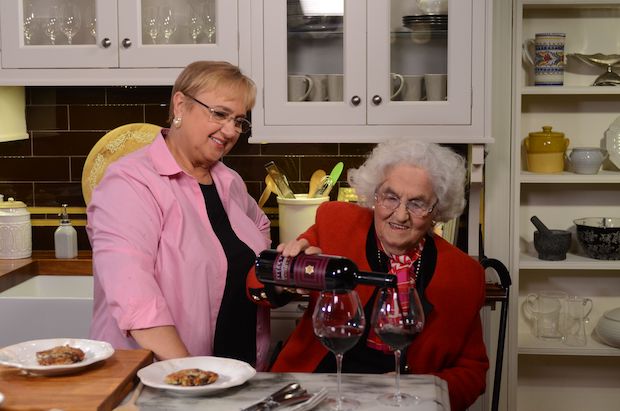
“Thank you Gaia, it’s a pleasure to meet you! Well, I would say that this book has been the harder one to write. I’ve published 13 books of recipes and while I was writing them I had no difficulties in expressing myself, but this autobiography, that I really wanted to share with my fans, has been the most difficult book to write. I knew it was time to reveal more of myself to my fans; many of those people wanted to know me better and they came into my life. Over the years they became a part of my family, they got to know my mom, my son and daughter, and I saw that this made them happy. Often they write that they’d like to sit at my table with my family and to share stories with us; that’s why I felt the need to share everything with them. My supporters had to know the whole story of Lidia because yes, Lidia’s a chef, Lidia’s an Italian woman who emigrated to America many years ago and enjoyed great success, but there’s a deeper story inside each of us to tell and I realized it was the time to tell mine and share my past.
My story is real and it’s a very topical one given what is happening in the world, especially before the pandemic when the issue of exiles and refugees was more visible. Maybe it’s a good time to recall that I too was a refugee. I’ve overcome many obstacles in my life, through them I acquired courage, and then opportunities came my way; they were already there but I had to be ready to take advantage of them. If my story can serve to motivate other people to get empowered, to follow their dreams and seize opportunities, then I’m happy. I really wanted to come closer to the people and inspire them. I hope I made it.”
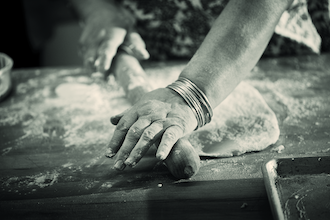
What episode or period of your life did you decide to highlight in your autobiography and why?
“The autobiography proceeds chronologically so the longest period of my life inevitably takes more space in the book. However, there are some points that I’ve highlighted because I wanted to convey the emotional resonance of the experience at that time. Growing up at my grandparents’ house was one of those experiences. That time coincides with my first contact ever with food and nature, and they taught the future Lidia not to waste food, to respect the farmers, and the cycle of the seasons and the earth. Each of those things is very important for me and was implanted in me by that very moment, therefore that period has been fundamental for the person that I became.
Then there is also the period of Lidia as an emigrant who fled, and with her family escaped a very dark period of her life without a home, without a roof and without roots. I was very attached to the land and then I was torn out of it, like a potato that is ripped out of the soil. So it was important for me to stress that moment too because it was characterized by a great emotion and it shaped me spiritually and emotionally, leading me to better understand the people around me, and how to share with them this tenderness and to stretch out my hand. All this I learned during the time I was in the camp, I was there as a child waiting for lunch or dinner with a plate in my hand.
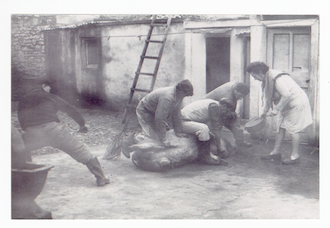
A poor dish, no doubt…
“Yes, for sure! It was a poor dish, for most of the meals we ate spaghetti with tomato sauce then a piece of cheese and an apple, this more or less every day. In a way it was a balanced meal; you had the energy from the pasta that filled your stomach, then some protein and some fruit. I went from this condition to that of refugee in America. I still remember those high hopes, typical of when you’re young. I thought: where will I go? What will I do? The impact was really powerful; we had no home, we didn’t know anyone and we didn’t speak the language. But all these obstacles have made me stronger and more aware of the world, they have taught me how to survive and how to trust in the love of a family. For us Italians the family is important, but in this case the family becomes the only thing. That’s probably why, even today, I’m still connected to my family in everything I do.”
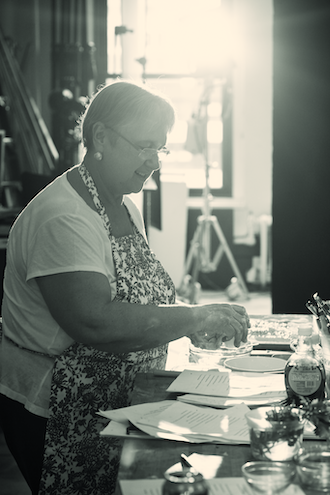
There are two and a half cultures in you: the Italian, the American and perhaps even a little bit of the Croatian. What do you think you have preserved of these cultures? Do you think this mix could have been the foundation of your success?
“That’s exactly right, you’ve understood it well, two and a half cultures because even the Croatian experience counts for me! This is exactly what I want to highlight, which is all the values that I’ve nurtured and collected from these cultures as I moved forward in my life; my experiences shaped me and made me who I am today. I arrived in America when I was 12 years old so I’m very American, but I have these two great cultures behind me; on one hand there is the Italian culture, a very creative culture that fills me with emotions, art, music, beauty, good food and family, then on the other hand there is the American culture that, a little more rigidly, taught me the art of business, marketing, promoting and advertising. These two united cultures are my two strengths. I must say, however, that I certainly have a little Croatian culture inside me and I am proud of it. I have so many memories of those years so that part of my life also counts, it made me very open to people and more aware, because on the border there were many emigrants with whom I lived even before I myself became an emigrant. Somehow it also helped to shape me, unknowingly, and be ready for what would happen to me later. It has been an experience that has enriched me as a person in many ways and these contacts that I’ve had over the years with different cultures have been important, no doubt, but my two winning cards are Italy and America.”
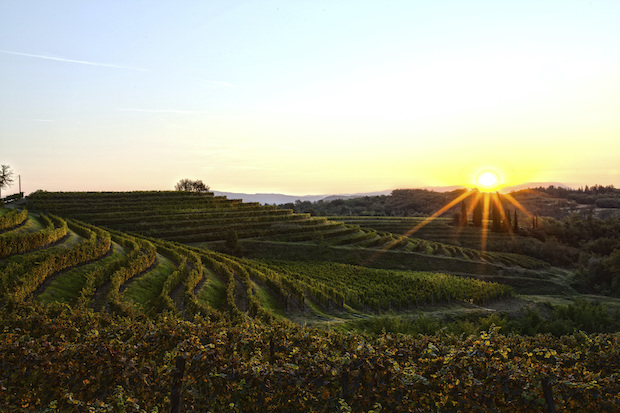
Lidia, in my opinion the winery has pretty much crowned what is the gastronomic business of your family; but what relevance does the wine have in your life? Do you talk about it in your book?
“Gaia, wine for us Italians is food; it is always at the table, it has always been at the table since as far back as I remember. My grandfather had a vineyard and we made wine and even oil, we had all those basic necessities of an Italian cuisine. I remember we would harvest grapes and olives, and then I would get in these big wooden barrels and I would stomp the grapes up and down with my feet, and when I would jump out of the barrel the bees would attack my legs. I have many beautiful memories, even at the table when as a child my grandfather gave me and my cousins a drop of wine in the water. They really did that back then. The grownups drank wine while we were given water with a few drops of wine to taste the flavor and share that moment together. It was a different time, Gaia, we didn’t have Coca-Cola or similar drinks, so for us this was the fun drink. My grandfather used to mix the water and wine and grandma would add a little sugar to sweeten the taste. So for me having wine at the table is like having food, it’s exactly like bread.
Back to the subject of vineyards in Italy: in Istria we have my grandmother’s house, which is now Croatia, but I go there often and gladly, and we also produce oil there. But we wanted solid roots in Italy for our family, so with my kids Joe and Tanya, we went looking for a place that made us feel at home and we found it in Friuli. It’s a beautiful place, there are mountains, it’s close to the East and the culture is very close to the one I grew up with. So, we found this little house with a vineyard and along with Joe, who is very passionate about wine, we bought this house. It was the beginning of our new roots in Italy. We often go there, we enjoy our holidays there and we produce our wine. Joe has worked hard in this business and we’ve also had some great acknowledgements in Italy including the Award of the 3 glasses of Gambero Rosso. It was really a great satisfaction to come back and put our roots back in that land. This place has become our refuge with real roots planted, not with a small apartment in the city on the 15th floor of some building.”
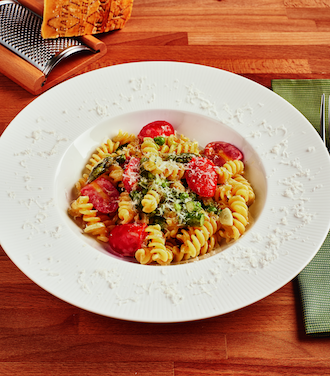
I know you’ve been asked this question a thousand times but let me try to do it a little differently: when you’re alone, even if we suspect this rarely happens, what do you cook for yourself when you don’t have to think about giving joy to others? I mean, what’s the dish you’d make just because it’s your favorite?
“Look Gaia, I confess that pasta is my comfort food. Looking back into my memories, as a child the big Sunday meal for us meant fresh pasta such as tagliatelle, garganelli, gnocchi or polenta. So the pasta has always conveyed a strong sense of family and home. Then too, I also feel physically satisfied when I eat pasta, you know? When I eat pasta it goes down smoothly and caresses me, so pasta is what I would cook. If I’m alone at home then it would definitely be a quick pasta to cook, even a pasta asciutta is fine. I put some water on to boil, then the spaghetti, then some garlic, oil and any little leftover I find in the fridge: a piece of sausage or bacon, whatever.
But even just pasta with garlic, oil and parsley is fine, as long as it is a simple pasta. Then, using some of the cooking water to make the sauce, the meal is ready. Maybe the only other thing I need is a good cheese! A good Parmigiano Grana maybe… yes, a nice Italian cheese is needed!”
Now that you’ve whetted our appetite we really don’t want to talk about politics, but with this upcoming election, the US has reached a crucial stage. Do you still trust American democracy to be able to find solutions for the United States to remain united, or do you fear that powerful divisions can widen the distance between the differing and opposing visions for the future of America?
“I have complete confidence in American democracy and the unity of the United States. Americans are special, they are very attached to a philosophy of justice and they know what is good for the future of America, so democracy will win, it will always remain with us. It must be said, however, that this year’s elections came at such a delicate time because of the pandemic, so this situation involves the people of the whole nation and puts us all in danger. We definitely need a strong government that can handle the situation and lead America. I am a little apprehensive about all this but I hope that we will return to some stability soon. America is still America, of course the situation at the moment is difficult, but we will manage it and hopefully, as soon as possible.
Some of our restaurants too have closed, and I’m sorry because there are many people who worked for us who are now out of a job, that’s why I can’t wait for the economy to restart.”
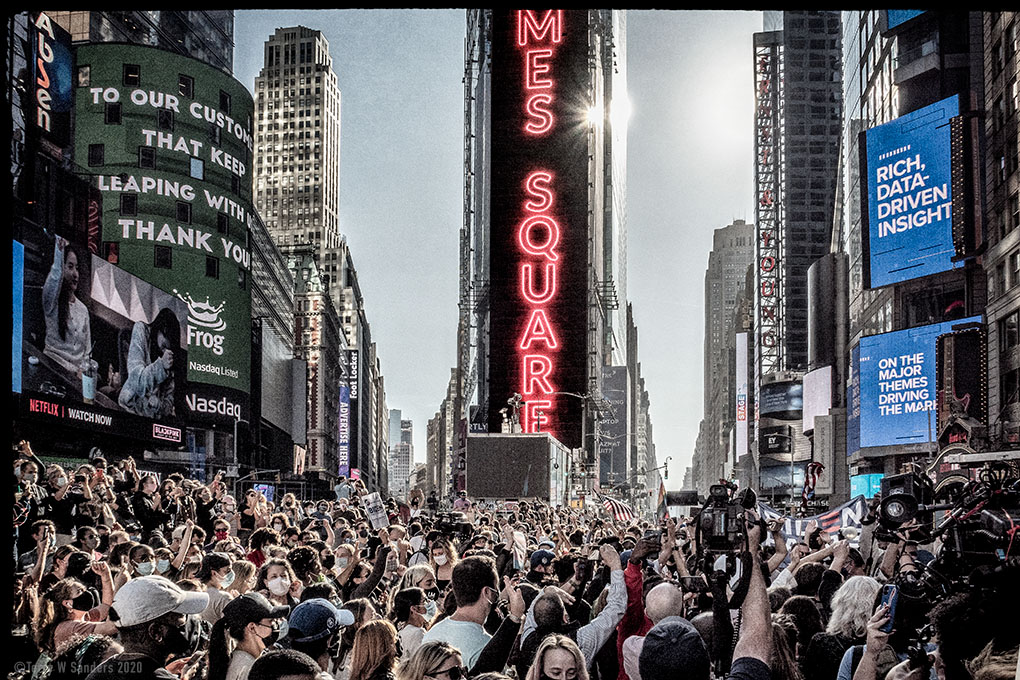
Speaking of closed restaurants, you’re also and above all a New Yorker. Lots of people have predicted the decline of New York because of Covid-19. What do you think? Will the city recover?
“I have every confidence that New York will recover, the question is just how long it will take. Manhattan is the heart of New York and I have to say that unfortunately, the beat of Manhattan has slowed down a lot this year; there are many closed shops, closed restaurants, empty offices and many people no longer come to the city to work because they prefer to do it from home. This slowdown is very much felt in this city buzzing with energy, perhaps more than in any other city in the world, and this is sad.
But you see, Gaia, there is also a great desire to go back to doing what we did before; will it take two or three months? Surely not, first we must stop the virus and only after defeating it New York will surely come back to shine, but this is true for the whole world not only for New York. In any case, life after Covid-19 will certainly be different, it will no longer be the same that we left 9 months ago, so we’ll all have to embrace this new life that will come and New York will definitely return to the pinnacle that it was, there’s no doubt.”
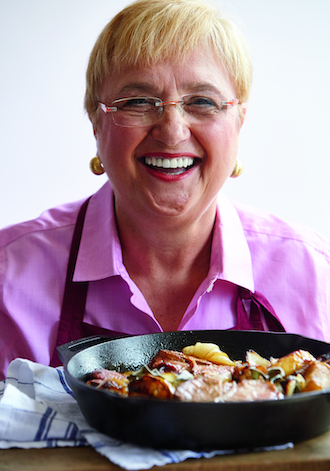
Lidia, do you believe the American dream still exists?
“Absolutely! America is great and there are so many opportunities, you have to find them, roll up your sleeves and get to work, you have to find a goal. America is growing, it’s still somewhat like a child. There are still many opportunities. Maybe it will take a little more time and effort, but I confess that even when my family and I came here without speaking the language it took some time to settle in and figure out which direction to move in before we fit into the community.”
To conclude the interview, would you like to share a message with Italians who dream of realizing their dreams in what, in spite of everything, is still considered the country of opportunity?
“I’ll tell you Gaia, I feel great in America but I also miss Italy, so I speak as a person who has always been nostalgic for her country but managed to blend the two lands well. Italy is beautiful and also offers many opportunities, perhaps smaller because it’s smaller, while America is bigger and makes us dream bigger, but you have to be able to grasp them. I would say to those who want to come to America: don’t give up your roots, take your country with you and the dreams you have. In America, Italian is always a winning card because Americans love Italy, food, wine, art, music and everything else is very appreciated. Do you want to come here? Then take all your Italian culture with you and tackle this great world of opportunities.”












